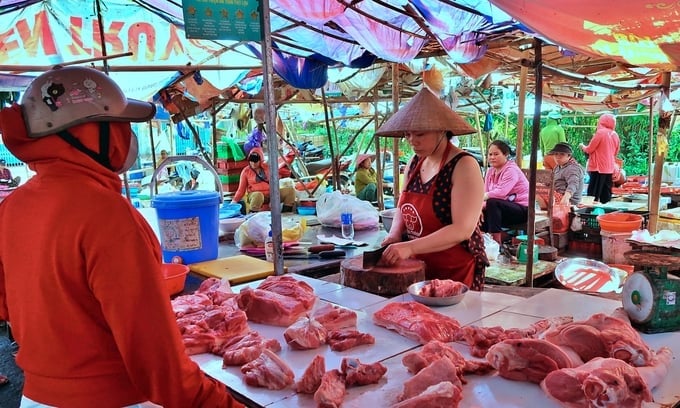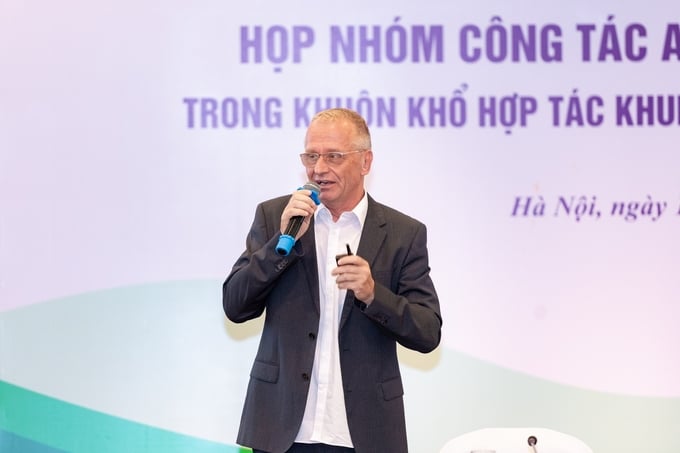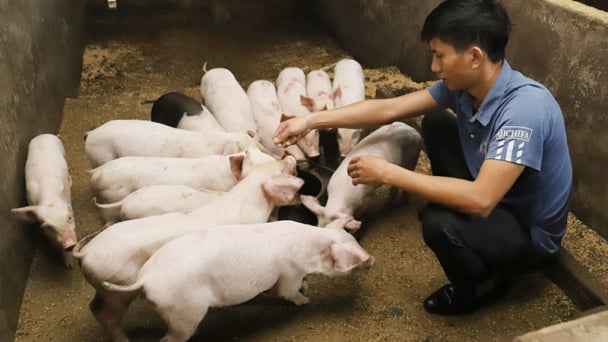June 19, 2025 | 23:39 GMT +7
June 19, 2025 | 23:39 GMT +7
Hotline: 0913.378.918
June 19, 2025 | 23:39 GMT +7
Hotline: 0913.378.918

A meat stall at a temporary market. Photo: ILRI.
Mr. Luu Duc Du, from the Vietnam Food Safety Authority (Ministry of Health), provided the data at the second meeting of the Food Safety Technical Working Group (FSTWG) under the Vietnam One Health Partnership (OHP) framework in September 2023.
Thus, the indicators for food poisoning (number of incidents, number of fatalities) during the 2019-2023 period have exhibited a more optimistic trend in comparison to the previous five years.
The number of food poisoning incidents in the first half of 2024 increased by only 4 cases (over 6%) in comparison to the first half of 2023. However, the number of individuals affected increased from 956 to 2,942 (a 307.7% increase). It is important to note that there were 9 collective food poisoning incidents in industrial and export processing zones, which affected 926 individuals. This represents an increase of 807 cases compared to the same period in 2023. In comparison to the same period, there was a decrease in the number of food poisoning incidents and cases in institutions.
Microorganisms and microbial toxins, including E. Coli, Salmonella, S. aureus, and Bacillus cereus, are responsible for a significant number of food poisoning cases.
Representatives from the Vietnam Food Safety Authority have stated that food poisoning is a risk that is challenging to eradicate, even in large and developed countries such as the United States, Japan, and South Korea, which continue to report cases on an annual basis. Furthermore, the proliferation of disease-causing bacteria, particularly those that reside in the intestines, can be facilitated by the presence of hot weather. In addition, certain places encounter challenges in terms of personnel and resources when it comes to safeguarding food and preventing food poisoning.
Food safety is also significantly influenced by socio-economic and market conditions. Some businesses establish low food ration standards for their employees in order to generate profit, which results in the utilization of inexpensive, hazardous ingredients. Further, there is still a lack of cognizance and consciousness among certain individuals regarding the prevention of food poisoning and food safety. Major challenges in regulating and reducing the risk of food poisoning are created by all of these factors.

ILRI offers evidence regarding food safety and traditional animal-based food value chains, according to Dr. Fred Unger, the Regional Representative of the International Livestock Research Institute (ILRI) in Asia. Photo: OHP.
The significance of examining the causes of food safety violations was underscored by Mr. Le Ba Anh, the Deputy Director of the Department of Quality, Processing, and Market Development. According to a representative from the Ministry of Agriculture and Rural Development (MARD), microbial factors that can manifest at any point from the farm to the table are among the factors that contribute to food safety violations. Consequently, the investigation must pinpoint specific agents and stages, including individuals, the environment, processing instruments, storage practices, and post-processing factors. This guarantees that food safety measures can effectively address preventive measures in the future.
In addition to the involvement of ministries and sectors, the promotion of multilateral cooperation in the field of food safety is a typical approach that requires expansion.
ILRI offers evidence regarding food safety and traditional animal-based food value chains, according to Dr. Fred Unger, the Regional Representative of the International Livestock Research Institute (ILRI) in Asia. Furthermore, ILRI endeavors to improve the ability to evaluate and communicate food safety risks, as well as to fortify early intervention and response solutions. The technical working group on food safety serves as a focal point for the resolution of these issues.
The medium and small-scale livestock sector in Vietnam is crucial, as it supplies 60% of pork to consumers in traditional markets, according to ILRI representatives. The livelihoods of millions of small-scale producers and households are sustained by livestock farming.
“Vietnamese consumers prefer fresh warm pork, mainly provided from medium and small-scale farms. To meet this demand, we need to assess the current situation and find ways to support the household livestock sector. Communication is essential for ILRI to propose appropriate solutions to improve the traditional pork value chain and other animal-based food value chains. Our goal is to make these chains safer through low-cost interventions that do not harm farmers' livelihoods while ensuring consumers enjoy safe animal-based products," Fred shared.
Translated by Linh Linh

(VAN) Biodiversity is being threatened by traditional remedies made from wildlife. Traditional medicine and humans must change to live in harmony with nature.

(VAN) Agrifood investment and finance solutions for people and the planet.

(VAN) Microplastic contamination has become pervasive in seafood, posing unprecedented challenges for food safety and marine ecosystems.

(VAN) Proactively using vaccines, combined with transport control and enhanced surveillance, is the only viable path toward biosecure and sustainable livestock production in Vietnam.

(VAN) Located in the southeast of Ho Chi Minh City, the Can Gio Mangrove Biosphere Reserve is considered the ‘green lung,’ a solid shield protecting the city.

(VAN) To address plastic pollution, closing the plastic recycling cycle will bring significant economic and environmental benefits.

(VAN) According to the Binh Thuan Department of Industry and Trade, in the first five months of 2025, Binh Thuan's dragon fruit export turnover increased by 20.65% compared to the same period last year.